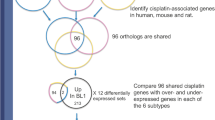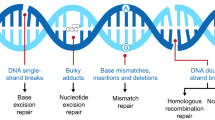Abstract
The most effective chemotherapeutic for glioblastoma (GBM) is the DNA alkylating agent temozolomide (TMZ). In a recent study by Hegi et al. benefit from TMZ was significantly associated with methylation of the promoter of the O6-methylguanine-DNA methyltransferase (MGMT) gene; however, the correlation was imperfect. Some patients with methylated tumors were short survivors and others with unmethylated tumors were long survivors. These exceptions have raised the possibility that TMZ response might be influenced by non-MGMT mechanisms. The effect of p53 status on response to TMZ was explored in traditional glioma cell lines (U87MG, U251MG, U343MG, U373MG, SF767, LN443 and LNZ308) and brain tumor initiating cells (BTICs—BT012, BT025, BT042, BT048, BT060 and BT069) in two ways: (1) inhibition of p53 by RNAi and (2) sensitivity in relation to intrinsic p53 status, either wild-type or mutant. Traditional glioma cell lines that did not express a functional p53 were significantly more sensitive to TMZ than cell lines with functionally intact wild-type p53 expression. Altered p53 expression or function had only minor effects on TMZ sensitivity in BTICs and tended to decrease sensitivity to TMZ. RNAi specific for p53 had little effect on sensitivity in p53 null glioma cells. Absence of a functional p53 increases TMZ sensitivity in traditional glioma cell lines, an effect that is independent of MGMT status, and not seen in BTICs. P53 status may influence response to TMZ in differentiated cells in a GBM with a negligible affect on its initiating cells.






Similar content being viewed by others
References
Stupp R, Mason WP, van den Bent MJ, Weller M, Fisher B, Taphoorn MJ, Belanger K, Brandes AA, Marosi C, Bogdahn U, Curschmann J, Janzer RC, Ludwin SK, Gorlia T, Allgeier A, Lacombe D, Cairncross JG, Eisenhauer E, Mirimanoff RO (2005) Radiotherapy plus concomitant and adjuvant temozolomide for glioblastoma. N Engl J Med 352:987–996
Hegi ME, Diserens AC, Gorlia T, Hamou MF, de Tribolet N, Weller M, Kros JM, Hainfellner JA, Mason W, Mariani L, Bromberg JE, Hau P, Mirimanoff RO, Cairncross JG, Janzer RC, Stupp R (2005) MGMT gene silencing and benefit from temozolomide in glioblastoma. N Engl J Med 352:997–1003
Olsson M, Lindahl T (1980) Repair of alkylated DNA in Escherichia coli. Methyl group transfer from O6-methylguanine to a protein cysteine residue. J Biol Chem 255:10569–10571
Cahill DP, Levine KK, Betensky RA, Codd PJ, Romany CA, Reavie LB, Batchelor TT, Futreal PA, Stratton MR, Curry WT, Iafrate AJ, Louis DN (2007) Loss of the mismatch repair protein MSH6 in human glioblastomas is associated with tumor progression during temozolomide treatment. Clin Cancer Res 13:2038–2045
Danam RP, Howell SR, Brent TP, Harris LC (2005) Epigenetic regulation of O6-methylguanine-DNA methyltransferase gene expression by histone acetylation and methyl-CpG binding proteins. Mol Cancer Ther 4:61–69
Everhard S, Tost J, El Abdalaoui H, Criniere E, Busato F, Marie Y, Gut IG, Sanson M, Mokhtari K, Laigle-Donadey F, Hoang-Xuan K, Delattre JY, Thillet J (2009) Identification of regions correlating MGMT promoter methylation and gene expression in glioblastomas. Neurooncology 11:348–356
Nutt CL, Chambers AF, Cairncross JG (1996) Wild-type p53 renders mouse astrocytes resistant to 1,3-bis(2-chloroethyl)-1-nitrosourea despite the absence of a p53-dependent cell cycle arrest [corrected]. Cancer Res 56:2748–2751
Xu GW, Nutt CL, Zlatescu MC, Keeney M, Chin-Yee I, Cairncross JG (2001) Inactivation of p53 sensitizes U87MG glioma cells to 1,3-bis(2-chloroethyl)-1-nitrosourea. Cancer Res 61:4155–4159
Xu GW, Mymryk JS, Cairncross JG (2005) Pharmaceutical-mediated inactivation of p53 sensitizes U87MG glioma cells to BCNU and temozolomide. Int J Cancer 116:187–192
Hirose Y, Berger MS, Pieper RO (2001) p53 effects both the duration of G2/M arrest and the fate of temozolomide-treated human glioblastoma cells. Cancer Res 61:1957–1963
Dinca EB, Lu KV, Sarkaria JN, Pieper RO, Prados MD, Haas-Kogan DA, Vandenberg SR, Berger MS, James CD (2008) p53 Small-molecule inhibitor enhances temozolomide cytotoxic activity against intracranial glioblastoma xenografts. Cancer Res 68:10034–10039
Kelly JJ, Stechishin O, Chojnacki A, Lun X, Sun B, Senger DL, Forsyth P, Auer RN, Dunn JF, Cairncross JG, Parney IF, Weiss S (2009) Proliferation of human glioblastoma stem cells occurs independently of exogenous mitogens. Stem Cells 27(8):1722–1733
Herman JG, Graff JR, Myohanen S, Nelkin BD, Baylin SB (1996) Methylation-specific PCR: a novel PCR assay for methylation status of CpG islands. Proc Natl Acad Sci USA 93:9821–9826
Back SA, Khan R, Gan X, Rosenberg PA, Volpe JJ (1999) A new alamar blue viability assay to rapidly quantify oligodendrocyte death. J Neurosci Methods 91:47–54
Van Meir EG, Kikuchi T, Tada M, Li H, Diserens AC, Wojcik BE, Huang HJ, Friedmann T, de Tribolet N, Cavenee WK (1994) Analysis of the p53 gene and its expression in human glioblastoma cells. Cancer Res 54:649–652
Asaoka K, Tada M, Sawamura Y, Ikeda J, Abe H (2000) Dependence of efficient adenoviral gene delivery in malignant glioma cells on the expression levels of the Coxsackievirus and adenovirus receptor. J Neurosurg 92:1002–1008
Xu GW, Mymryk JS, Cairncross JG (2005) Inactivation of p53 sensitizes astrocytic glioma cells to BCNU and temozolomide, but not cisplatin. J Neurooncol 74:141–149
Brada M, Judson I, Beale P, Moore S, Reidenberg P, Statkevich P, Dugan M, Batra V, Cutler D (1999) Phase I dose-escalation and pharmacokinetic study of temozolomide (SCH 52365) for refractory or relapsing malignancies. Br J Cancer 81:1022–1030
Rao DD, Senzer N, Cleary MA, Nemunaitis J (2009) Comparative assessment of siRNA and shRNA off target effects: what is slowing clinical development. Cancer Gene Ther 16(11):807–809
Blough MD, Zlatescu MC, Cairncross JG (2007) O6-methylguanine-DNA methyltransferase regulation by p53 in astrocytic cells. Cancer Res 67:580–584
Singh SK, Clarke ID, Hide T, Dirks PB (2004) Cancer stem cells in nervous system tumors. Oncogene 23:7267–7273
Weller M, Felsberg J, Hartmann C, Berger H, Steinbach JP, Schramm J, Westphal M, Schackert G, Simon M, Tonn JC, Heese O, Krex D, Nikkhah G, Pietsch T, Wiestler O, Reifenberger G, von Deimling A, Loeffler M (2009) Molecular predictors of progression-free and overall survival in patients with newly diagnosed glioblastoma: a prospective translational study of the German glioma network. J Clin Oncol 27(34):5743–5750
Li S, Zhang W, Chen B, Jiang T, Wang Z (2009) Prognostic and predictive value of p53 in low MGMT expressing glioblastoma treated with surgery, radiation and adjuvant temozolomide chemotherapy. Neurol Res. doi:10.1179/016164109X12478302362536
Acknowledgments
This work was supported by Alberta Heritage Foundation for Medical Research, Hotchkiss Brain Institute New Initiatives Fund and Alberta Cancer Foundation Chair in Brain Tumour Research.
Author information
Authors and Affiliations
Corresponding author
Rights and permissions
About this article
Cite this article
Blough, M.D., Beauchamp, D.C., Westgate, M.R. et al. Effect of aberrant p53 function on temozolomide sensitivity of glioma cell lines and brain tumor initiating cells from glioblastoma. J Neurooncol 102, 1–7 (2011). https://doi.org/10.1007/s11060-010-0283-9
Received:
Accepted:
Published:
Issue Date:
DOI: https://doi.org/10.1007/s11060-010-0283-9




